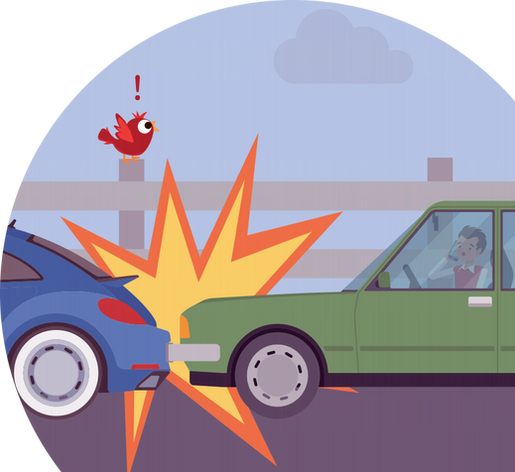Don’t fly solo – Contacting your Insurance Company directly is the most efficient way to report a claim.

Reporting a Claim
Flying through an insurance claim can feel a little turbulent – but don’t worry, Cheep Insurance is here to help.
To start the claims process, it’s best to contact your insurance provider’s claims department – all the phone numbers are listed below.
Contact Your Insurance Carrier to Report a Claim
Frequently Asked Questions
Reporting a claim directly to your Insurance Carrier is the quickest way to get the ball rolling. All the Insurance Carriers we work with have 24/7 claims team to help you anytime – day or night. Speaking to a claims representative at the company level ensures that the correct details are collected and passed on to an adjuster as soon as possible.
Your Insurance Carrier (or Company) is listed on your pink liability card.
Can’t find your card? No problem. Here are two quick & easy ways to find that information:
- Use the Cheep Insurance mobile app
- Log in using your email address (username) and password
- From the Home screen, click “Policy Info”
- Select the policy that the claim is affecting and select “overview” – this screen will show your insurance company name
- Log in via our website
- Select “Client Login” from the menu
- Log in using your email address (username) and password.
- Click “Billing & Policy Docs”
- Open your recent policy document – your insurance carrier name will be listed
If you are having trouble logging in, you can always reach out to our service team at 1-866-92-CHEEP or [email protected].
Whether or not you file an insurance claim can depend on many factors. It is always best to file a claim if there is a third party involved, or if there may be injuries; this could protect you down the road.
A few things you may want to consider when deciding whether to file a claim:
- The extent of the damage – if the damage is only to your vehicle, and you can repair the damage without significant cost, it may not be worth filing a claim if the cost is below or near your deductible. Claims may cause your insurance rates to increase on renewal. Of course, if the damage is significant, or involves someone else’s vehicle, filing a claim may be necessary.
- Your coverage – if you do not have physical damage coverage (collision and/or comprehensive coverages) on your insurance policy, damages to your vehicle may not be covered. For example, damages to your vehicle resulting from an accident you’re deemed “at fault” for would only be covered if you have collision coverage on your policy, and damages to your vehicle resulting from fire, theft, vandalism, impact with an animal, or windshield damage, would only be covered if you have comprehensive coverage on your policy.
Ultimately, the decision to file an insurance claim is a personal one that depends on your individual circumstances. Be sure to weigh the costs and benefits carefully and consult with your insurance broker if you have any questions or concerns. Don’t be afraid to spread your wings and take the necessary steps to protect yourself and your property.
The information you need to make an insurance claim can vary depending on the type of insurance and the specific policy you have. However, here are some general pieces of information that are typically required:
- Policy number: This is the unique identifier for your insurance policy and is found on your insurance documents.
- Date and time of the incident: You will need to provide the date and time the incident occurred (ex: the date and itime of a car accident or break-in)
- Description of the incident: You should provide a detailed description of what happened, including any damage or loss that occurred and any injuries or potential injuries.
- Contact information (yours and any third party): You will need to provide your contact information, including your name, address, and phone number; you will also want to try to collect the information for any third parties or witnesses involved.
- Police report or incident report: If the incident involved a crime or accident, you may need to provide a police report or incident report.
- Photos or videos: It’s a good idea to take photos or videos of the damage or loss as evidence to support your claim.
- Receipts or estimates: if you are making a claim for property damage, you may need to provide receipts or estimates for the cost of repairs or replacement. You do not need this information to start a claim, but may need it throughout the process.
It seems like a lot to remember when there’s an accident – but you can always give our flock a call and we’ll help you fly through it.
If you have questions about what your policy covers, you can find an overview of your coverages on your policy documents.
If you’re wondering what the listed coverages on your policy cover, check out our blog for more information:
- Car Insurance 101: Understanding Basic Coverages
- Car Insurance 102: Liability Limits & Deductibles
- 5 Car Insurance Add-Ons That Could Save Your Tail
As always, our friendly service team is here to answer any questions you have have about coverage! You can reach them at 1-866-92-CHEEP or [email protected].
Keep in mind that your insurance premiums are based on several factors, such as where you live, your insurance history, if you have had any claims, and demographic information. Home & auto rates also have a number of specific factors based on things like your driving record and vehicle for car insurance, and your home’s construction, recent updates, etc. for home insurance. If you have a history of multiple claims or if you’re considered high-risk you may see a more significant increase in your insurance premiums.
It’s important to talk to your insurance company or broker to understand how a claim could affect your rates and to explore your options for minimizing the impact on your premiums. And remember, accidents happen, and that’s what insurance is for – to help protect you in those unexpected moments. If you are deemed “at-fault” for a claim, your insurance premiums will be effected; however, “not-at-fault” claims such as a broken windshield on your auto policy do not affect your premium.
Not every accident results in an increase in your premium – but every claim reported can help save you a headache in the long run.
See our blog on What Happens when you Report a Claim for more information on the claims process.
Once you’ve given your insurance provider an overview the situation, they will start to investigate. An adjuster will usually contact you within 24-48 hours to walk you through next steps. This could include helping you coordinate a rental car or alternative living arrangements if those things are coverage under your policy.
Wondering what happens behind-the-scenes during a claim? See our blog post on What Happens When You Report An Insurance Claim?
An insurance deductible is the amount you’re responsible for paying out of pocket before your insurance coverage kicks in.
For example, let’s say you have a $500 deductible and you get into an accident that causes $2,000 in damage. In most cases, you’ll need to pay the first $500 (the deductible) and your insurance will cover the remaining $1,500. There are some instances when a deductible will not apply – this will be decided by the insurance company during the claim process.
While choosing a higher deductible can lower your monthly insurance premiums, it also means you’ll have to pay more out of pocket if you have an accident. It’s important to find the right balance for your budget and needs, and that’s where Cheep Insurance can help! Give us a call or email us at [email protected] to discuss the options that will be best for you.
Being involved in an accident with a driver that has no insurance can add additional stress to an already flighty situation. There are a few things to keep in mind:
- Contact your insurance company. If the damage is significant, there are injuries, or you just decide it is best to file a claim, give your insurance company a call – you are covered for accidents involving uninsured or unidentified drivers (eg. hit & run).
- Try to still exchange information; even if the other driver doesn’t have insurance – try to get their name, contact information, plate number, and make and model of their car.




















 Most policies insured with Cheep Insurance are Agency Bill/IFS financed policies. You can determine who manages your payments by following the directions below. If you are still not sure who manages your payments, call our team as funds paid directly to the insurance company when they should go to IFS will cause large delays.
Most policies insured with Cheep Insurance are Agency Bill/IFS financed policies. You can determine who manages your payments by following the directions below. If you are still not sure who manages your payments, call our team as funds paid directly to the insurance company when they should go to IFS will cause large delays.